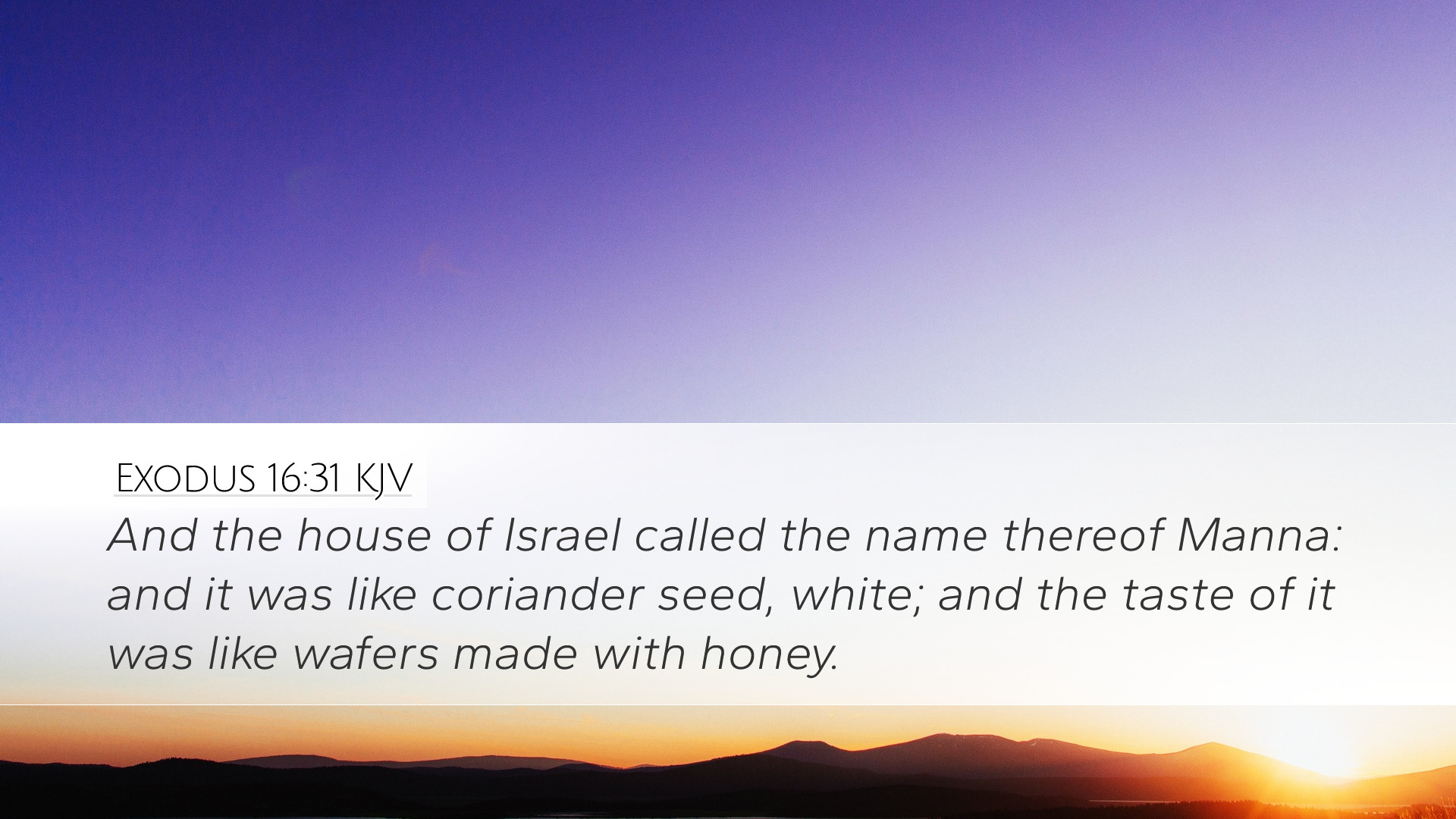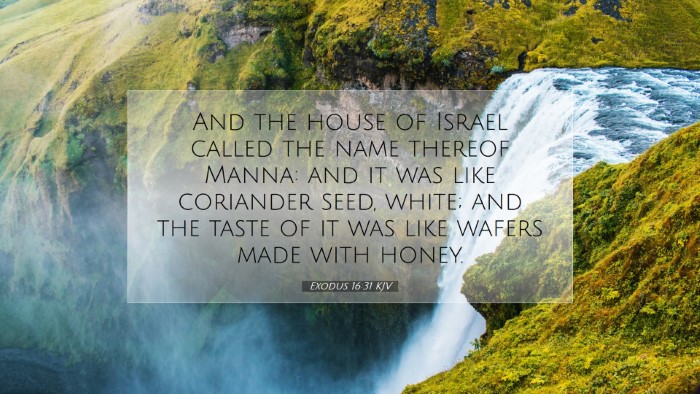Commentary on Exodus 16:31
Exodus 16:31 states, "And the house of Israel called the name thereof Manna: and it was like coriander seed, white; and the taste of it was like wafers made with honey." This verse presents a significant moment in the biblical narrative, revealing divine provision for the Israelites during their wilderness wanderings. Scholars have explored this verse from various angles, delving into its theological, historical, and practical implications.
Theological Significance
The naming of 'Manna' reflects the Israelites' response to God's miraculous provision. As Matthew Henry notes, it signifies the people's acknowledgment that their sustenance was entirely dependent on the Lord's grace. Manna was not only food but also a visible symbol of God's covenant relationship with His people.
- Divine Provision: The fact that the Israelites were given manna daily illustrates the principle of divine provision. Albert Barnes suggests that this act was designed to teach the Israelites to rely on God for their daily needs, reminding them that "man does not live by bread alone, but by every word that comes from the mouth of God" (Deuteronomy 8:3).
- Type of Christ: Adam Clarke elaborates on the typological significance of manna, arguing that it foreshadows Christ, the Bread of Life. Just as manna sustained the physical lives of the Israelites, Christ nourishes the spiritual lives of believers.
- Community Identity: Manna served to unite the Israelites as a community that shared in God's provision. The experience of collecting and consuming manna reinforced their identity as God's chosen people.
Historical Context
The Israelites encountered a dire situation in the wilderness with limited resources and harsh conditions. Historical commentaries bring light to the realities of life in the desert where food scarcity posed a significant challenge. According to Barnes, this miracle occurred in an environment where survival depended heavily on God’s will and providence, revealing His power to sustain those He has chosen.
- Wilderness Experience: The wilderness itself becomes a spiritual metaphor for testing and reliance. It illustrates the Israelites' transition from slavery in Egypt to freedom, albeit a daunting journey that required faith.
- Lessons in Obedience: The instruction that manna would be provided daily meant they could not hoard it. This was a lesson in obedience, teaching them to depend on God’s timing and provision.
Literary Aspects
The description of manna as "like coriander seed" and its taste "like wafers made with honey" provides an insight into its physical appearance and delightfulness. Henry notes that the use of sensory language invites readers to imagine the experience of consuming this miraculous sustenance, evoking a sense of wonder.
- Imagery and Symbolism: The imagery speaks to God’s abundance and desire to bless His people with good gifts. The sweetness of the manna serves as a metaphor for the joy and peace found in God’s provision.
- God's Faithfulness: The consistent provision of manna emphasizes God's faithfulness to His covenant promises, reinforcing the theme of His enduring care for His people.
Practical Applications
The implications of Exodus 16:31 extend beyond its historical context, inviting reflection on how believers today can apply its lessons in their lives.
- Faith in Daily Needs: Just as the Israelites were taught to collect manna daily, believers are reminded to approach each day with faith, trusting God for their needs. This daily dependence cultivates a habit of prayer and gratitude.
- Community and Sharing: The shared experience of gathering manna becomes a model for the Christian community to care for one another, ensuring that all members are provided for, mirroring the early church's practices.
- Finding Joy in God’s Gifts: The sweetness of manna encourages believers to find joy and satisfaction in God’s provisions, both physical and spiritual. Clarke emphasizes the importance of recognizing and appreciating God’s blessings in everyday life.
Conclusion
Exodus 16:31 encapsulates not only a historical account of God's provision for the Israelites but also offers deep theological reflections, literary richness, and practical applications. Through the lens of public domain commentaries, we see the multifaceted nature of this passage, challenging pastors, students, theologians, and Bible scholars alike to explore its implications for faith and practice today.


